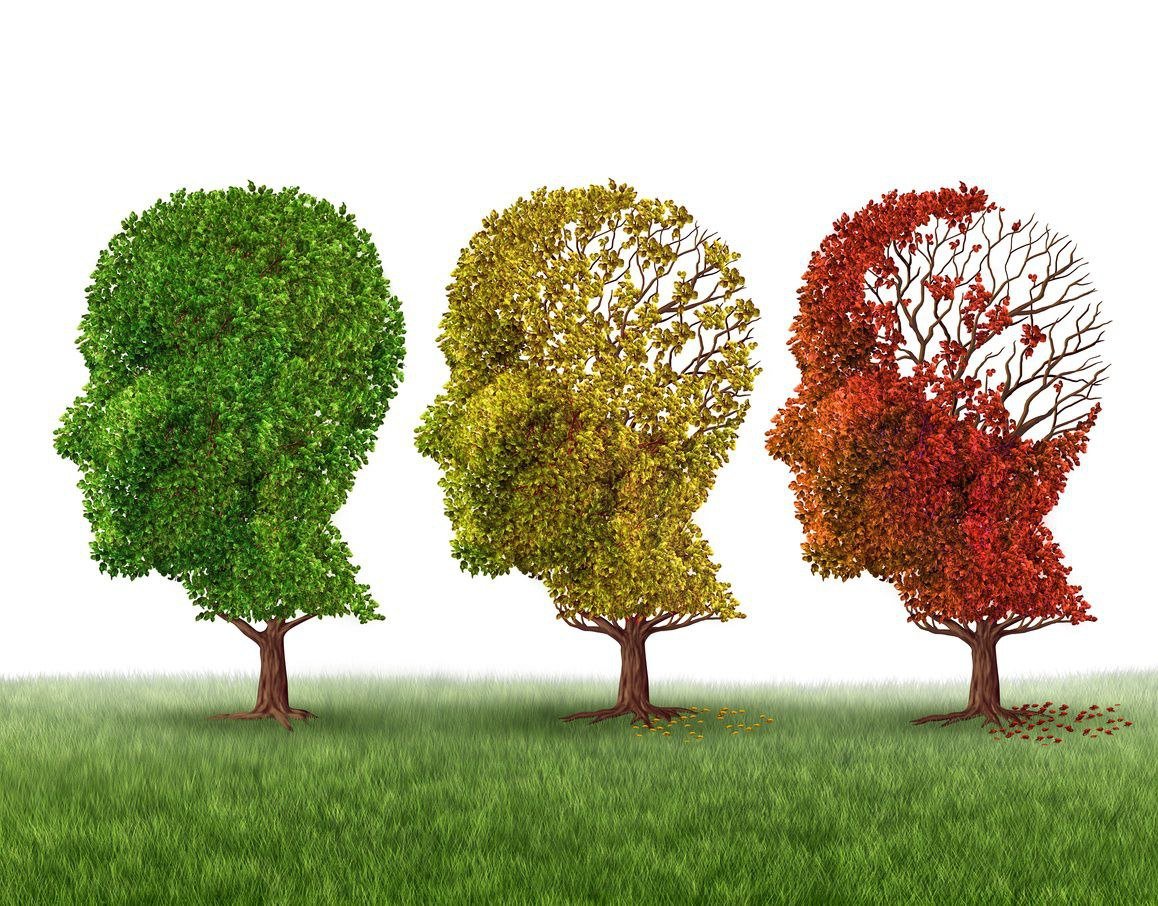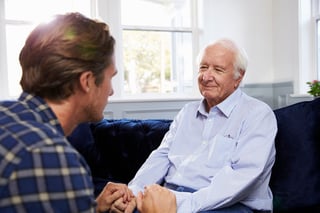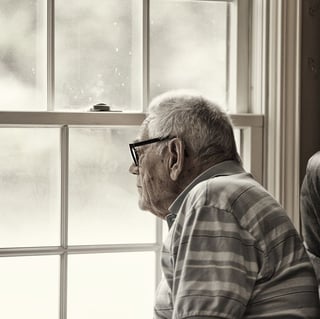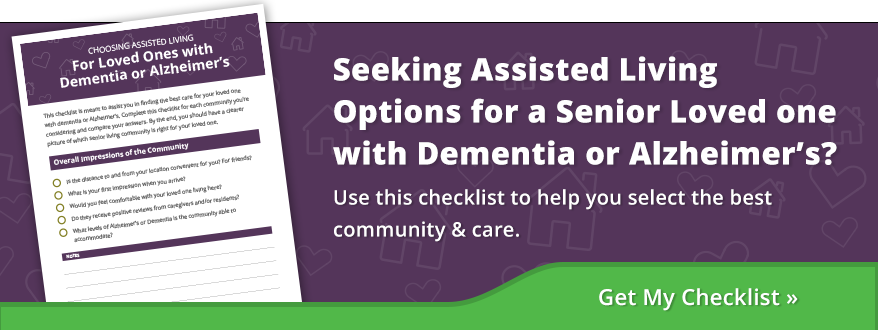
Understanding the Stages of Dementia & Alzheimer's
Health & Aging | Caregiver Support
Updated from the original publication on September 28, 2017.
Caring for someone with dementia or Alzheimer’s disease can be a long and emotional journey. According to the Alzheimer's Association, more than 5 million Americans are living with the disease. But dementia and Alzheimer’s aren’t simple diseases. There are many different parts to them, and understanding those parts, or stages, can be beneficial when caring for a loved one. It can also help you decide when the best time to seek professional help will be.
Experts say changes in the brain can start years before any symptoms begin to show. Because of this, a dementia diagnosis can come at different points in the disease's progression. The following are general symptoms related to each stage. Dementia and Alzheimer’s affect each person differently, so each person may experience these stages and symptoms in different ways.
Stage 1: Mild
 During the mild stage of dementia, you may confuse your loved one’s symptoms with “normal” forgetfulness. For the most part, your loved one will be able to live independently. They will be able to drive, work, socialize, and perform other tasks that they've been doing their whole life.
During the mild stage of dementia, you may confuse your loved one’s symptoms with “normal” forgetfulness. For the most part, your loved one will be able to live independently. They will be able to drive, work, socialize, and perform other tasks that they've been doing their whole life.
But they may start to feel as if they are having frequent memory lapses, and family members might notice trouble concentrating. If your loved one decides to go to the doctor, he or she may discover more advanced memory trouble and difficulty concentrating during a detailed examination.
Common symptoms for Stage 1 include:
- Problems remembering the right word or name
- Trouble remembering names when introduced to new people
- Forgetting material that one has just read
- Losing or misplacing a valuable object
- Trouble with planning or organizing
- Struggling to perform tasks in social or work settings
- Making decisions with uncharacteristically poor judgement
Caring for Stage 1 Dementia
Many people who would be considered in Stage 1 may still be mostly independent and able to complete daily tasks on their own. It can be difficult to differentiate the symptoms of Stage 1 dementia from forgetfulness associated with aging. If you are worried that a loved one is showing signs of unusual lapses in memory, urge them to get checked out by a doctor. Their doctor will be able to take a closer look and can make a diagnosis from there. You can also encourage your loved one to stick to a daily schedule. Routines will make it easier to remember things.
Stage 2: Moderate
Moderate dementia or Alzheimer’s is typically the longest stage, often lasting several years. At this stage, symptoms are noticeable to friends and family, and even new acquaintances. You may notice your loved one mixing up their words and getting frustrated or confused. They may also display erratic behavior, like refusing to bathe or acting aggressively.
often lasting several years. At this stage, symptoms are noticeable to friends and family, and even new acquaintances. You may notice your loved one mixing up their words and getting frustrated or confused. They may also display erratic behavior, like refusing to bathe or acting aggressively.
This is because the damage to your loved one’s nerve cells in their brain can make it difficult to express what they’re feeling or thinking, and it can be frustrating for them. Other symptoms of Stage 2 include:
- Forgetting about events or about their own history
- Feeling moody or withdrawn, especially in socially or mentally challenging situations
- Confusion about where they are or what day it is
- The need for help dressing for the season or the occasion
- Trouble controlling bladder and bowels in some individuals
- Changes in sleep patterns
- An increased risk of wandering or becoming lost
- Personality changes, like increased suspiciousness and delusions or compulsive, repetitive behavior
Caring for Stage 2 Dementia
Caring for someone in Stage 2 can be tricky, since it is the broadest stage and each person’s progression through the stage will be different. Some people can still be relatively independent with the help from loved ones, while others will need a more structured environment like what can be found at a Continuing Care Retirement Community.
If you will be the primary caregiver for your loved one with Stage 2 dementia, there are some things you can do to help them maintain their independence for as long as possible. Encourage your loved one to participate in activities they enjoy and can complete without too much help from you. The focus of these activities should be on enjoyment instead of achievement.
READ: 10 Activities for Seniors with Alzheimer's
You may also have to assist your loved one with daily hygienic activities in this stage. This can mean help with bathing, using the restroom, or dressing. Some of these activities can be very personal, and your loved one may show some resistance. Offer to help only as much as is needed. This could be as simple as reminding your loved to to take a bath or helping them set up the bathroom beforehand. But as dementia progresses, it could mean helping them in and out of the bath or dealing with incontinence-related accidents. Caregiving during this stage can become difficult. You may want to consider a Personal Care or Assisted Living community to provide your loved one with the support they need.
Stage 3: Severe
The last stage will require the most care, usually from professional caregivers. In this stage, people progressively lose the ability to engage in the world, to hold coherent conversations, and to control their muscles.
They may still be able to say words or phrases, but holding a conversation or communicating their feelings will be difficult. Significant personality and behavior changes will start to take place as memory and cognitive skills decline, and they will need extensive help with daily activities.
Individuals in Stage 3 may also:
- Need 24/7 assistance with daily activities and personal care
- Lose awareness of their surroundings or recent experiences
- Experience changes in the ability to walk, sit, swallow or perform other physical abilities
- Become vulnerable to infections
Caring for Stage 3 Dementia
The best course of action for someone who has stage 3 dementia would be to consider moving to a Skilled Nursing community if they're not living in one already. 24/7 care can be extremely difficult for loved ones to provide, but a community will be able to provide around-the-clock care and supervision by trained staff.
That doesn’t mean that you, the caregiver, are out of the picture. Although a person in stage 3 typically loses the ability to talk and express needs, research suggests that some core of the person's self may remain. This means you may be able to continue to connect with them throughout the late stage of the disease. You can play their favorite music, look through old photos or even just sit outside on a nice day together. These activities will help you connect on a deeper level and can provide your loved one with a sense of dignity.
Caregivers of those with Alzheimer's face many challenges. Whether you're in the early, middle, or late stage of the disease, coping can be hard. It's important to remember that every moment you spend with your loved one is precious. Try to find meaning and pleasure in the time given, because every caregiver knows the day will eventually come when you have to say goodbye.
If you or a loved one has Alzheimer's or dementia, you are not alone. The more you learn about the disease and the sooner you seek support, the better prepared you’ll be for the journey ahead.
If you are starting your search for an Assisted Living or Personal Care community for your loved one with dementia or Alzhemier's, download our free checklist below. It has tips on what to look for, and can help you find the community that is the best fit for your loved one.
About Presbyterian Senior Living
As the trusted leader in aging services, Presbyterian Senior Living combines over 97 years of experience with innovative approaches to senior communities and services. Across our 27 communities in PA, MD, OH, and DE, we serve over 6,000 seniors. We are committed to: FOSTERING teamwork and responsibility. UPHOLDING integrity in every action. EMBRACING innovation to create opportunities for everyone’s success. LEADING with compassion and respect.

